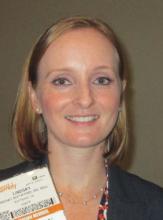SAN DIEGO – If you’re skeptical about the impact that you as a primary care provider can make on patients who seek assistance from you with weight loss, think again, advised Dr. Lindsay Botsford.
"You can really make a big difference in your office," Dr. Botsford, a family physician who practices in Sugar Land, Tex., said at the annual meeting of the American Academy of Family Physicians.
During her presentation, she spotlighted the success of Practice-Based Opportunities for Weight Reduction (POWER-UP), a 2-year randomized controlled trial of obesity treatment in the primary care setting. For the trial, 390 patients at six primary care practices were randomized to one of three interventions: usual care, which consisted of quarterly visits that included education about weight management; brief lifestyle counseling, which consisted of quarterly primary care visits combined with short monthly sessions with lifestyle coaches who instructed patients about behavioral control; and enhanced brief lifestyle counseling, which consisted of quarterly primary care visits combined with short monthly sessions with lifestyle coaches who instructed patients about behavioral control, plus meal replacements or orlistat or sibutramine to potentially increase weight loss (N. Engl. J. Med. 2011;365[2]:1969-79).
At the end of the second year, patients in the enhanced lifestyle counseling group lost an average of 4.6 kg, which exceeded the average weight loss experienced by patients in the brief lifestyle counseling and usual care groups (an average of 2.9 kg and 1.7 kg, respectively). The proportion of patients who achieved a weight loss of more than 5% at the end of the second year was also greatest in the enhanced lifestyle group (34.9% vs. 26% and 21.5% in the other two groups, respectively).
Some patients harbor sensitivity about their weight, so if they want to talk about the issue, Dr. Botsford recommended avoiding the term "obesity" and instead using terms such as "weight," "excess weight," "unhealthy body weight," and "BMI." She also recommended involving other members of the staff. For example, front desk staff can ask patients to fill out a fitness inventory and medical assistants can check BMI, measure waist circumference, and provide basic counseling advice about weight loss strategies such as keeping a food journal and portion control.
Regarding how patients perceive overweight physicians, Dr. Botsford noted, "In general, patients find overweight physicians less credible. I find that a little sad, but your view on the subject can influence patients. If you are not at your healthy weight, try to overcome this by sharing personal stories with them."
In counseling patients who express interest in losing weight, she said she begins with a 24-hour dietary recall and then reviews the U.S. Preventive Services Task Force’s "5 A’s" framework to create goals. The five A’s include assess (ask about or assess behavioral health risk[s] and factors affecting choice of behavior change goals); advise (give clear, specific, and personalized behavior change advice, including information about harms and benefits); agree (collaboratively select treatment goals and methods based on interest and willingness to change); assist (using behavior change techniques, help patient to acquire the skills, confidence, and social or environmental supports for behavior change, supplemented with medical treatments when needed); and arrange (schedule follow-up to provide ongoing assistance or support and to adjust the treatment plan as needed).
Other evidence-based counseling tips include recommending that patients avoid artificial sweetener, eating out of a bag, eating in front of the television, eating bread when dining out, and being mindful of liquid calorie intake. She also said she advises patients to stay hydrated, leave one-third of the portion on the plate when dining out, order "small" sizes when possible, and use small plates and bowls at home.
"Study after study has shown that low-calorie diets – 1,000-1,200 kcal/day for women and 1,200-1,600 kcal/day for men are the most successful for maintaining weight loss in the long term," Dr. Botsford said. "Adherence is a big thing when it comes to diets. The most common thing is that people stop. They can’t stick with it. Low glycemic load may help adherence. That’s still within the context of a low-calorie diet. There is certain evidence that having more fiber and more protein will make you feel fuller along the way, but in the end, a low-calorie diet is best."
Tools that can help patients keep a handle on food intake include the AAFP\'s initiative Americans in Motion Healthy Interventions and smartphone apps such as Lose It!, Calorie Counter and Diet Tracker by MyFitnessPal.com, healthfinder.gov, and Weight Watchers Mobile. "Exercise alone is better than nothing, but it only translates into a small weight loss," Dr. Botsford said. "However, exercise reduces blood pressure, triglycerides, and fasting glucose, and it decreases abdominal adipose tissue. To make the real difference you need exercise and diet. You also improve your strength, balance, and peak oxygen consumption. The more intense your exercise, [the more] you will increase your weight loss."


